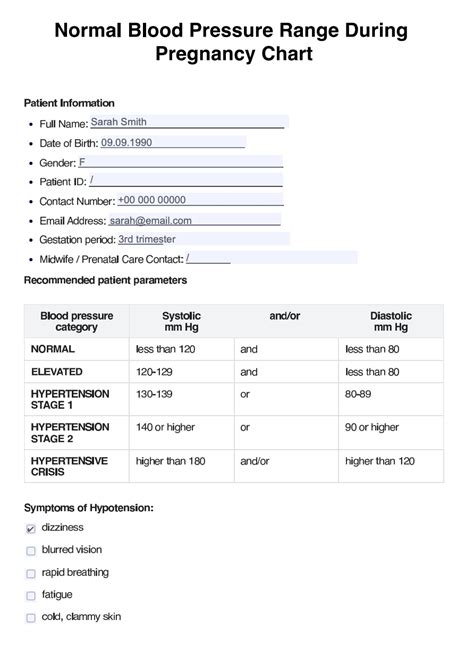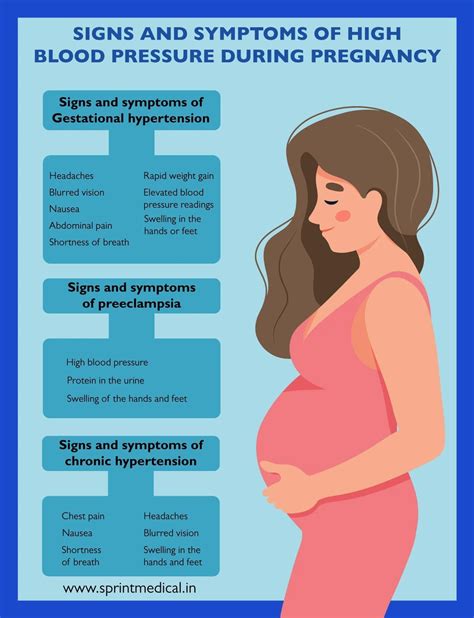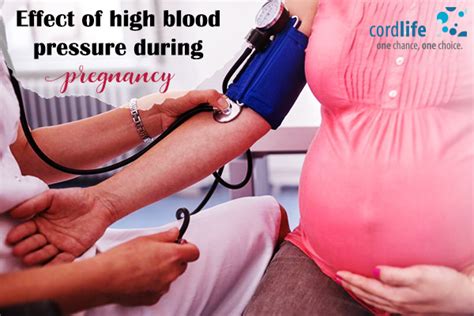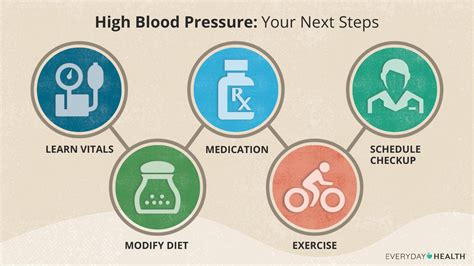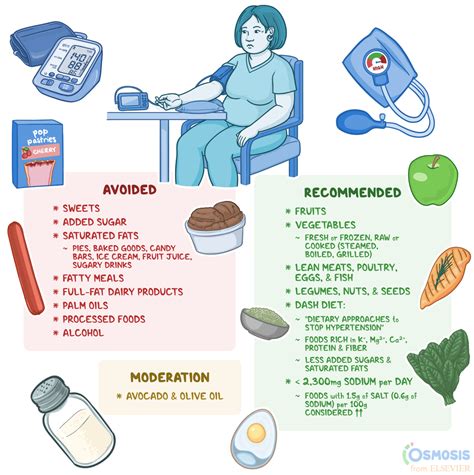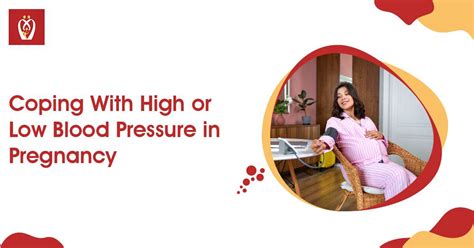Pregnancy is a life-changing experience that brings immense joy and excitement, but it also comes with its fair share of challenges. One of the most critical aspects of pregnancy is managing blood pressure. High blood pressure during pregnancy can lead to complications, not only for the mother but also for the baby. It is essential to monitor and manage blood pressure levels to ensure a healthy pregnancy. In this article, we will delve into the world of pregnancy blood pressure, exploring its causes, effects, and most importantly, providing 7 valuable tips to help manage it.
Maintaining a healthy blood pressure level is crucial during pregnancy. Normal blood pressure levels typically range from 90/60 mmHg to 120/80 mmHg. However, during pregnancy, blood pressure can fluctuate due to various factors, such as hormonal changes, weight gain, and blood volume increases. It is vital to understand that high blood pressure can lead to severe complications, including preeclampsia, a condition characterized by high blood pressure and damage to organs such as the kidneys and liver. Therefore, it is essential to take proactive steps to manage blood pressure levels during pregnancy.
The importance of managing blood pressure during pregnancy cannot be overstated. High blood pressure can increase the risk of premature birth, low birth weight, and even stillbirth. Moreover, uncontrolled high blood pressure can lead to long-term health consequences for both the mother and the baby. Fortunately, with the right guidance and support, it is possible to manage blood pressure levels and ensure a healthy pregnancy. By following a combination of lifestyle modifications, dietary changes, and medical interventions, expectant mothers can reduce their risk of developing high blood pressure and its associated complications.
Understanding Pregnancy Blood Pressure
Understanding pregnancy blood pressure is crucial for managing it effectively. Blood pressure is measured in millimeters of mercury (mmHg) and is expressed as two numbers: systolic and diastolic. The systolic number represents the pressure in the blood vessels when the heart beats, while the diastolic number represents the pressure between beats. During pregnancy, blood pressure is typically measured at each prenatal visit to monitor for any changes or abnormalities. It is essential to understand that blood pressure can fluctuate throughout the day, and multiple readings may be necessary to determine an accurate average.
Causes of High Blood Pressure During Pregnancy
Several factors can contribute to high blood pressure during pregnancy. Some of the most common causes include:
* Genetic predisposition: Women with a family history of high blood pressure are more likely to develop it during pregnancy.
* Obesity: Excess weight can increase blood pressure levels and reduce blood flow to the placenta.
* Age: Women over 35 years old are at a higher risk of developing high blood pressure during pregnancy.
* Pre-existing medical conditions: Conditions such as kidney disease, diabetes, and thyroid disorders can increase the risk of high blood pressure.
* Lifestyle factors: Poor diet, lack of physical activity, and stress can all contribute to high blood pressure.
Effects of High Blood Pressure on Pregnancy
High blood pressure can have severe consequences for both the mother and the baby. Some of the potential effects include:
* Preeclampsia: A condition characterized by high blood pressure and damage to organs such as the kidneys and liver.
* Premature birth: High blood pressure can increase the risk of premature birth, which can lead to respiratory and other health problems for the baby.
* Low birth weight: High blood pressure can reduce blood flow to the placenta, leading to low birth weight and potential health problems for the baby.
* Stillbirth: In severe cases, high blood pressure can increase the risk of stillbirth.
7 Tips for Managing Pregnancy Blood Pressure

Fortunately, there are several ways to manage blood pressure levels during pregnancy. Here are 7 valuable tips to help expectant mothers reduce their risk of developing high blood pressure:
1. **Maintain a healthy weight**: Excess weight can increase blood pressure levels, so it is essential to maintain a healthy weight throughout pregnancy.
2. **Eat a balanced diet**: A diet rich in fruits, vegetables, whole grains, and lean protein can help lower blood pressure levels.
3. **Stay hydrated**: Drinking plenty of water can help lower blood pressure levels and reduce the risk of dehydration.
4. **Exercise regularly**: Regular physical activity can help lower blood pressure levels and improve overall health.
5. **Manage stress**: Stress can increase blood pressure levels, so it is essential to find healthy ways to manage stress, such as meditation, yoga, or deep breathing exercises.
6. **Get enough sleep**: Lack of sleep can increase blood pressure levels, so it is essential to get plenty of rest throughout pregnancy.
7. **Monitor blood pressure regularly**: Regular blood pressure monitoring can help identify any changes or abnormalities, allowing for prompt medical intervention if necessary.
Lifestyle Modifications for Managing Pregnancy Blood Pressure
In addition to the 7 tips mentioned earlier, there are several lifestyle modifications that can help manage blood pressure levels during pregnancy. Some of these modifications include:
* Quitting smoking: Smoking can increase blood pressure levels and reduce blood flow to the placenta.
* Reducing caffeine intake: High levels of caffeine can increase blood pressure levels and reduce blood flow to the placenta.
* Avoiding excessive salt intake: High levels of salt can increase blood pressure levels, so it is essential to consume salt in moderation.
* Practicing relaxation techniques: Techniques such as meditation, yoga, and deep breathing exercises can help reduce stress and lower blood pressure levels.
Dietary Changes for Managing Pregnancy Blood Pressure
Dietary changes can also play a crucial role in managing blood pressure levels during pregnancy. Some of the key dietary changes include:
* Increasing potassium intake: Potassium can help lower blood pressure levels, so it is essential to consume potassium-rich foods such as bananas, leafy greens, and sweet potatoes.
* Increasing calcium intake: Calcium can help lower blood pressure levels, so it is essential to consume calcium-rich foods such as dairy products, leafy greens, and fortified plant-based milk.
* Increasing omega-3 fatty acid intake: Omega-3 fatty acids can help reduce inflammation and lower blood pressure levels, so it is essential to consume omega-3 rich foods such as fatty fish, nuts, and seeds.
Medical Interventions for Managing Pregnancy Blood Pressure
In some cases, medical interventions may be necessary to manage blood pressure levels during pregnancy. Some of the common medical interventions include:
* Medications: Medications such as beta-blockers, diuretics, and calcium channel blockers can help lower blood pressure levels.
* Bed rest: In severe cases, bed rest may be necessary to reduce blood pressure levels and prevent complications.
* Hospitalization: In severe cases, hospitalization may be necessary to monitor blood pressure levels and prevent complications.
What is the normal blood pressure range during pregnancy?
+
Normal blood pressure levels typically range from 90/60 mmHg to 120/80 mmHg.
What are the symptoms of high blood pressure during pregnancy?
+
Symptoms of high blood pressure during pregnancy may include headaches, dizziness, and vision changes.
How often should blood pressure be monitored during pregnancy?
+
Blood pressure should be monitored at each prenatal visit to track any changes or abnormalities.
Can high blood pressure during pregnancy be prevented?
+
While high blood pressure during pregnancy cannot be completely prevented, lifestyle modifications and dietary changes can help reduce the risk.
What are the potential complications of high blood pressure during pregnancy?
+
Potential complications of high blood pressure during pregnancy include preeclampsia, premature birth, low birth weight, and stillbirth.
In conclusion, managing blood pressure levels during pregnancy is crucial for ensuring a healthy pregnancy and reducing the risk of complications. By following a combination of lifestyle modifications, dietary changes, and medical interventions, expectant mothers can reduce their risk of developing high blood pressure and its associated complications. We hope this article has provided you with valuable insights and tips to help you manage your blood pressure levels during pregnancy. If you have any further questions or concerns, please do not hesitate to reach out to your healthcare provider. Additionally, we invite you to share your experiences and tips for managing blood pressure during pregnancy in the comments section below. Your input can help other expectant mothers navigate this critical aspect of pregnancy.
